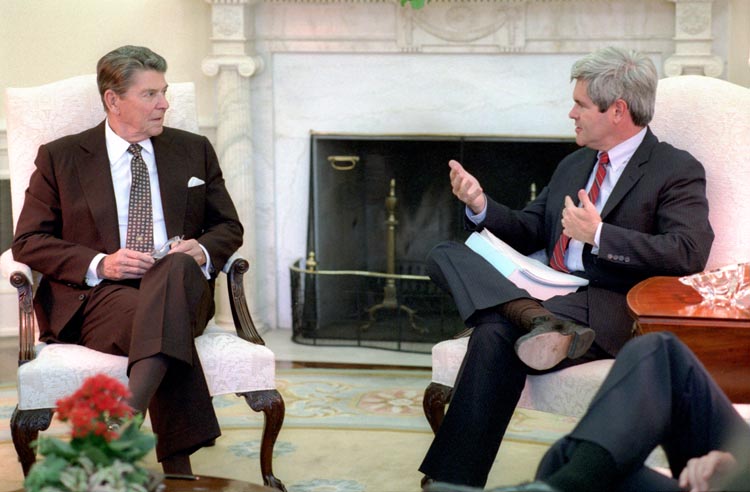
I would assume after last night’s embarrassing debate performance, Newt Gingrich is consigned to runner-up status, a sad, pompous buffoon who was only seriously considered because of the dearth of GOP options. But perhaps conservatives view things differently than I do? At any rate, the New York Times’ Timothy Egan righteously undresses the overstuffed hypocrite in “Deconstructing a Demogogue.” An excerpt:
“Back in 1994, while plotting his takeover of the House, Gingrich circulated a memo on how to use words as a weapon. It was called ‘Language: A Key Mechanism of Control.’ Republicans were advised to use certain words in describing opponents — sick, pathetic, lie, decay, failure, destroy. That was the year, of course, when Gingrich showed there was no floor to his descent into a dignity-free zone, equating Democratic Party values with the drowning of two young children by their mother, Susan Smith, in South Carolina.
Today, if you listen carefully to any Gingrich takedown, you’ll usually hear words from the control memo.
He even used them, as former Assistant Secretary of State Elliott Abrams wrote in National Review Online this week, in going after President Reagan, calling him ‘pathetically incompetent,’ as Abrams reported. And he compared Reagan’s meeting with the Soviet leader Mikhail Gorbachev to ‘the most dangerous summit for the West since Adolf Hitler met with Neville Chamberlain in 1938 in Munich.”
•••••••••••
The full Gingrich memo about the use of language:
Language: A Key Mechanism of Control
As you know, one of the key points in the GOPAC tapes is that “language matters.” In the video “We are a Majority,” Language is listed as a key mechanism of control used by a majority party, along with Agenda, Rules, Attitude and Learning. As the tapes have been used in training sessions across the country and mailed to candidates we have heard a plaintive plea: “I wish I could speak like Newt.”
That takes years of practice. But, we believe that you could have a significant impact on your campaign and the way you communicate if we help a little. That is why we have created this list of words and phrases.
This list is prepared so that you might have a directory of words to use in writing literature and mail, in preparing speeches, and in producing electronic media. The words and phrases are powerful. Read them. Memorize as many as possible. And remember that like any tool, these words will not help if they are not used.
While the list could be the size of the latest “College Edition” dictionary, we have attempted to keep it small enough to be readily useful yet large enough to be broadly functional. The list is divided into two sections: Optimistic Positive Governing words and phrases to help describe your vision for the future of your community (your message) and Contrasting words to help you clearly define the policies and record of your opponent and the Democratic party.
Please let us know if you have any other suggestions or additions. We would also like to know how you use the list. Call us at GOPAC or write with your suggestions and comments. We may include them in the next tape mailing so that others can benefit from your knowledge and experience.
Optimistic Positive Governing Words
Use the list below to help define your campaign and your vision of public service. These words can help give extra power to your message. In addition, these words help develop the positive side of the contrast you should create with your opponent, giving your community something to vote for!
- active(ly)
- activist
- building
- candid(ly)
- care(ing)
- challenge
- change
- children
- choice/choose
- citizen
- commitment
- common sense
- compete
- confident
- conflict
- control
- courage
- crusade
- debate
- dream
- duty
- eliminate good-time in prison
- empower(ment)
- fair
- family
- freedom
- hard work
- help
- humane
- incentive
- initiative
- lead
|
- learn
- legacy
- liberty
- light
- listen
- mobilize
- moral
- movement
- opportunity
- passionate
- peace
- pioneer
- precious
- premise
- preserve
- principle(d)
- pristine
- pro- (issue): flag, children, environment, reform
- prosperity
- protect
- proud/pride
- provide
- reform
- rights
- share
- strength
- success
- tough
- truth
- unique
- vision
- we/us/our
|
Contrasting Words
Often we search hard for words to define our opponents. Sometimes we are hesitant to use contrast. Remember that creating a difference helps you. These are powerful words that can create a clear and easily understood contrast. Apply these to the opponent, their record, proposals and their party.
- abuse of power
- anti- (issue): flag, family, child, jobs
- betray
- bizarre
- bosses
- bureaucracy
- cheat
- coercion
- “compassion” is not enough
- collapse(ing)
- consequences
- corrupt
- corruption
- criminal rights
- crisis
- cynicism
- decay
- deeper
- destroy
- destructive
- devour
- disgrace
- endanger
- excuses
- failure (fail)
- greed
- hypocrisy
- ideological
- impose
- incompetent
- insecure
- insensitive
|
- intolerant
- liberal
- lie
- limit(s)
- machine
- mandate(s)
- obsolete
- pathetic
- patronage
- permissive attitude
- pessimistic
- punish (poor …)
- radical
- red tape
- self-serving
- selfish
- sensationalists
- shallow
- shame
- sick
- spend(ing)
- stagnation
- status quo
- steal
- taxes
- they/them
- threaten
- traitors
- unionized
- urgent (cy)
- waste
- welfare
|



